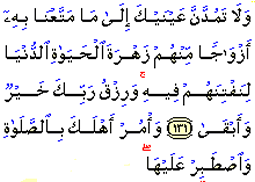Satisfaction, ConsumingHalal, ResolvingConflicts
Issue 195 » November 8, 2002 - Ramadan 3, 1423
General
Ta
ha Commentary: There is no reason why the artificial sheen of wealth and power should lure the believers. Whatever little they earn as a result of their sweat and toil is much better for honest and righteous people since it leads to their good in both worlds - the present and the next. The Prayer: a mean to change the perspective on life The believers are told to enjoin prayer on their household. This is likely to change their children's perspective on life, their values, and the focus of their attentions; a change that will make them satisfied with their lawfully earned livelihood, even if it be meagre. This will lead them to prefer a virtuous life ensuing from faith and godliness over a life of luxury and self-indulgence arising out of sin, disobedience and excessive worldliness. [Compiled from "Towards Understanding the Quran" by Sayyid Abul Ala Mawdudi, p. 243] |
Consuming Halal On the authority of Abu Hurairah, The Messenger of Allah (peace be upon him) said: “Allah the Almighty is good and accepts only that which is good. Allah has commanded the faithful to do that which he commanded the messengers, and the Almighty has said: ‘O ye messengers! Eat of the good things and do right.’ And Allah the Almighty has said, ‘O ye who believe! Eat of the good things wherewith We have provided you.’” Then the Prophet mentioned [the case of] a man who, having journeyed far, is disheveled and dusty and who spreads out his hands to the sky [saying] : "O Lord! O Lord!" Meanwhile, his (the traveller’s) food is unlawful, his drink unlawful, his clothing unlawful, and he is nourished unlawfully; so how can he be answered! (Related by Muslim) |
Resolving Interpersonal Conflicts Traditionally, Ramadan has been a time when Muslims have resolved their interpersonal conflicts. The emphasis is deflected from oneself and one’s desires to the Creator in the spiritual sense, which in turn translates into charity, compassion, and good behavior. Thus, the mutual misgivings and grudges that were before all too consuming in relationships, are now perceived as petty and unnecessary. The Prophet Muhammad, upon whom be peace, advised his wife Aisha to increase this prayer during Ramadan: “Oh Allah (God), you are the Forgiver and you love to forgive, so forgive me”. The emphasis over and over again in many ahadith (sayings) of the Prophet Muhammad, upon whom be peace, pertaining to the benefits of Ramadan is on forgiveness. Since we all aspire to be forgiven by our Creator, we also take to heart the advice of our beloved Prophet, upon whom be peace, that in order to receive forgiveness from our Creator, we must also forgive our fellow human beings. This motivates us to make amends and to seek forgiveness, thereby freeing ourselves from the stresses of unresolved conflicts. The ability to forgive and to let go of hurts and grudges puts us on the fast track to healing. Our energies that were wasted on nursing old grudges are now directed to positive and constructive ends. [Compiled from "Ramadan, A Time to Heal" by Shahina Siddiqui] |
